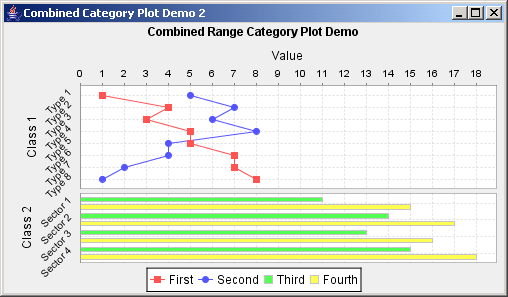JFreeChart: Combined Category Plot Demo 2: bar chart on the left, and a line chart on the right

/* ===========================================================
* JFreeChart : a free chart library for the Java(tm) platform
* ===========================================================
*
* (C) Copyright 2000-2004, by Object Refinery Limited and Contributors.
*
* Project Info: http://www.jfree.org/jfreechart/index.html
*
* This library is free software; you can redistribute it and/or modify it under the terms
* of the GNU Lesser General Public License as published by the Free Software Foundation;
* either version 2.1 of the License, or (at your option) any later version.
*
* This library is distributed in the hope that it will be useful, but WITHOUT ANY WARRANTY;
* without even the implied warranty of MERCHANTABILITY or FITNESS FOR A PARTICULAR PURPOSE.
* See the GNU Lesser General Public License for more details.
*
* You should have received a copy of the GNU Lesser General Public License along with this
* library; if not, write to the Free Software Foundation, Inc., 59 Temple Place, Suite 330,
* Boston, MA 02111-1307, USA.
*
* [Java is a trademark or registered trademark of Sun Microsystems, Inc.
* in the United States and other countries.]
*
* ------------------------
* CombinedXYPlotDemo2.java
* ------------------------
* (C) Copyright 2002-2004, by Object Refinery Limited.
*
* Original Author: David Gilbert (for Object Refinery Limited).
* Contributor(s): -;
*
* $Id $
*
* Changes
* -------
* 23-Apr-2002 : Version 1 (DG);
* 23-May-2002 : Renamed MultiPlotDemo --> CombinedXYPlotDemo (DG);
* 25-Jun-2002 : Removed unnecessary imports (DG);
* 10-Oct-2002 : Fixed errors reported by Checkstyle (DG);
* 25-Feb-2004 : Renamed XYToolTipGenerator --> XYItemLabelGenerator (DG);
*
*/
package org.jfree.chart.demo;
import java.text.DecimalFormat;
import java.text.SimpleDateFormat;
import org.jfree.chart.ChartPanel;
import org.jfree.chart.JFreeChart;
import org.jfree.chart.axis.DateAxis;
import org.jfree.chart.axis.NumberAxis;
import org.jfree.chart.labels.StandardXYToolTipGenerator;
import org.jfree.chart.plot.CombinedRangeXYPlot;
import org.jfree.chart.plot.XYPlot;
import org.jfree.chart.renderer.xy.StandardXYItemRenderer;
import org.jfree.chart.renderer.xy.XYBarRenderer;
import org.jfree.chart.renderer.xy.XYItemRenderer;
import org.jfree.data.time.Day;
import org.jfree.data.time.TimeSeries;
import org.jfree.data.time.TimeSeriesCollection;
import org.jfree.data.xy.IntervalXYDataset;
import org.jfree.data.xy.XYDataset;
import org.jfree.date.SerialDate;
import org.jfree.ui.ApplicationFrame;
import org.jfree.ui.RefineryUtilities;
/**
* A demonstration application showing how to create a combined chart. A
* bar chart is displayed on the left, and a line chart on the right.
*
*/
public class CombinedXYPlotDemo2 extends ApplicationFrame {
/**
* Constructs a new demonstration application.
*
* @param title the frame title.
*/
public CombinedXYPlotDemo2(final String title) {
super(title);
final JFreeChart chart = createCombinedChart();
final ChartPanel panel = new ChartPanel(chart, true, true, true, false, true);
panel.setPreferredSize(new java.awt.Dimension(500, 270));
setContentPane(panel);
}
/**
* Creates a combined XYPlot chart.
*
* @return the combined chart.
*/
private JFreeChart createCombinedChart() {
// create subplot 1...
final IntervalXYDataset data1 = createDataset1();
final XYItemRenderer renderer1 = new XYBarRenderer(0.20);
renderer1.setToolTipGenerator(
new StandardXYToolTipGenerator(
StandardXYToolTipGenerator.DEFAULT_TOOL_TIP_FORMAT,
new SimpleDateFormat("d-MMM-yyyy"), new DecimalFormat("0,000.0")
)
);
final XYPlot subplot1 = new XYPlot(data1, new DateAxis("Date"), null, renderer1);
// create subplot 2...
final XYDataset data2 = createDataset2();
final XYItemRenderer renderer2 = new StandardXYItemRenderer();
renderer2.setToolTipGenerator(
new StandardXYToolTipGenerator(
StandardXYToolTipGenerator.DEFAULT_TOOL_TIP_FORMAT,
new SimpleDateFormat("d-MMM-yyyy"), new DecimalFormat("0,000.0")
)
);
final XYPlot subplot2 = new XYPlot(data2, new DateAxis("Date"), null, renderer2);
// create a parent plot...
final CombinedRangeXYPlot plot = new CombinedRangeXYPlot(new NumberAxis("Value"));
// add the subplots...
plot.add(subplot1, 1);
plot.add(subplot2, 1);
// return a new chart containing the overlaid plot...
return new JFreeChart(
"Combined (Range) XY Plot", JFreeChart.DEFAULT_TITLE_FONT, plot, true
);
}
// ****************************************************************************
// * JFREECHART DEVELOPER GUIDE *
// * The JFreeChart Developer Guide, written by David Gilbert, is available *
// * to purchase from Object Refinery Limited: *
// * *
// * http://www.object-refinery.com/jfreechart/guide.html *
// * *
// * Sales are used to provide funding for the JFreeChart project - please *
// * support us so that we can continue developing free software. *
// ****************************************************************************
/**
* Creates a sample dataset.
*
* @return Series 1.
*/
private IntervalXYDataset createDataset1() {
// create dataset 1...
final TimeSeries series1 = new TimeSeries("Series 1", Day.class);
series1.add(new Day(1, SerialDate.MARCH, 2002), 12353.3);
series1.add(new Day(2, SerialDate.MARCH, 2002), 13734.4);
series1.add(new Day(3, SerialDate.MARCH, 2002), 14525.3);
series1.add(new Day(4, SerialDate.MARCH, 2002), 13984.3);
series1.add(new Day(5, SerialDate.MARCH, 2002), 12999.4);
series1.add(new Day(6, SerialDate.MARCH, 2002), 14274.3);
series1.add(new Day(7, SerialDate.MARCH, 2002), 15943.5);
series1.add(new Day(8, SerialDate.MARCH, 2002), 14845.3);
series1.add(new Day(9, SerialDate.MARCH, 2002), 14645.4);
series1.add(new Day(10, SerialDate.MARCH, 2002), 16234.6);
series1.add(new Day(11, SerialDate.MARCH, 2002), 17232.3);
series1.add(new Day(12, SerialDate.MARCH, 2002), 14232.2);
series1.add(new Day(13, SerialDate.MARCH, 2002), 13102.2);
series1.add(new Day(14, SerialDate.MARCH, 2002), 14230.2);
series1.add(new Day(15, SerialDate.MARCH, 2002), 11235.2);
final TimeSeriesCollection collection = new TimeSeriesCollection(series1);
collection.setDomainIsPointsInTime(false); // this tells the time series collection that
// we intend the data to represent time periods
// NOT points in time. This is required when
// determining the min/max values in the
// dataset's domain.
return collection;
}
/**
* Creates a sample dataset.
*
* @return Series 2.
*/
private XYDataset createDataset2() {
// create dataset 2...
final TimeSeries series2 = new TimeSeries("Series 2", Day.class);
series2.add(new Day(3, SerialDate.MARCH, 2002), 16853.2);
series2.add(new Day(4, SerialDate.MARCH, 2002), 19642.3);
series2.add(new Day(5, SerialDate.MARCH, 2002), 18253.5);
series2.add(new Day(6, SerialDate.MARCH, 2002), 15352.3);
series2.add(new Day(7, SerialDate.MARCH, 2002), 13532.0);
series2.add(new Day(8, SerialDate.MARCH, 2002), 12635.3);
series2.add(new Day(9, SerialDate.MARCH, 2002), 13998.2);
series2.add(new Day(10, SerialDate.MARCH, 2002), 11943.2);
series2.add(new Day(11, SerialDate.MARCH, 2002), 16943.9);
series2.add(new Day(12, SerialDate.MARCH, 2002), 17843.2);
series2.add(new Day(13, SerialDate.MARCH, 2002), 16495.3);
series2.add(new Day(14, SerialDate.MARCH, 2002), 17943.6);
series2.add(new Day(15, SerialDate.MARCH, 2002), 18500.7);
series2.add(new Day(16, SerialDate.MARCH, 2002), 19595.9);
return new TimeSeriesCollection(series2);
}
/**
* Starting point for the demonstration application.
*
* @param args ignored.
*/
public static void main(final String[] args) {
final CombinedXYPlotDemo2 demo = new CombinedXYPlotDemo2("Combined XY Plot Demo");
demo.pack();
RefineryUtilities.centerFrameOnScreen(demo);
demo.setVisible(true);
}
}
 jfreechart-1.0.0-rc1.zip( 3,559 k)
jfreechart-1.0.0-rc1.zip( 3,559 k)Related examples in the same category